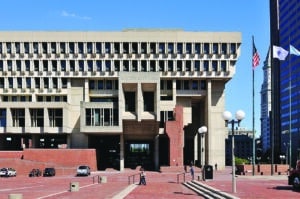The Boston City Council is scheduled to take up a proposal to ask the state legislature for permission to implement as much as a 2 percent tax on most real estate sales in the city over $2 million.
The home rule petition, championed by Councilors Lydia Edwards and Kim Janey, seeks to raise at least $100 million and possibly up to $168 million per year for affordable housing construction and other housing programs, Edwards’ office said.
“Boston needs new resources to address the housing crisis,” Edwards said in a statement to Banker & Tradesman. “A real estate transfer fee will massively scale up our investment in affordable housing and ensure those who are trading real estate like the stock market are contributing to solutions that stabilize our communities.”
The proposal the council will consider Wednesday has been watered down from an earlier proposal that would have included both a 6 percent tax on all transactions and a 25 percent tax on all properties sold within two years, aimed at discouraging the flipping of properties. Boston Mayor Marty Walsh is supportive of the new proposal, his office confirmed.
Real estate industry groups say they are still opposed to the tax, although NAIOP-MA CEO Tamarra Small said her group was heartened by the removal of the flipping provision. Both NAIOP and the Greater Boston Association of Realtors said they fear the tax could both discourage new construction and cause developers or buyers of buildings to pass on the cost of the tax on to their tenants.
“You’re buying a pro forma, you’re looking at your cap rate, and if the city adds some additional fees, you’re going to ask who am I going to pass that down to,” said Melvin Vieira Jr., a member of the GBAR board of directors.
Small said NAIOP is urging the city to redirect a portion of the property tax revenues growing thanks to the city’s building boom to affordable and middle-income housing instead, and an official comment letter the group submitted to the council last week noted the revenue from any transfer tax would be as volatile as the property market.
“More housing is needed, but we should be careful not to attempt to solve that issue while detracting future investment in the city through mechanisms like the proposed transfer tax,” she said in an email.
If the council passes Edwards’ and Janey’s proposal Wednesday, it will join similar home rule petitions from Provincetown, Somerville, Acton and Brookline on Beacon Hill. The legislature will need to approve the home rule petition and then the Boston City Council will need to pass more detailed legislation – which could contain exemptions for certain property types and triggers for changing the rate in response to economic conditions, Edwards office said – to implement any future tax.
Several greater Boston and Cape Cod legislators have proposed expanding the state’s existing real estate transfer tax to benefit affordable housing construction, some of which could be combined into a single proposal to be heard early next year. In addition, Gov. Charlie Baker has proposed a 0.2 percent increase in the state’s existing real estate transfer tax that would generate as much as $137 million a year to help cities and towns prepare for and adjust to climate change.




 |
| 


